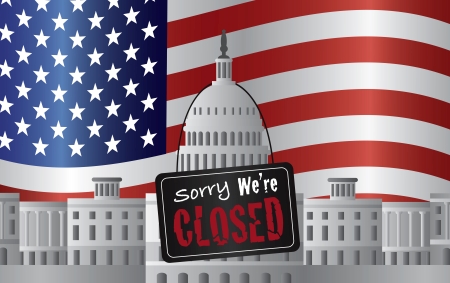Two of the hardest-hitting issues of the global economy today are Brexit and the US government shutdown.
On Wednesday, new analyst Simon Angelo brought to light what could happen next for Brexit…and how it could affect your wealth. Take a look if you haven’t seen it already.
Today, I wanted to start a discussion on the US government shutdown…
If you haven’t heard, President Trump and Democrat leaders have come to a standstill over the issue of his wall along the Mexican border. Trump wants over $5 billion. The Dems are offering about $1 billion…for security.
Between the two, no resolution has come forth…and in the meantime, the US government has temporarily closed down any ‘non-essential’ offices.
It’s been almost a month since the shutdown began…starting with a disagreement over an appropriations bill just before Christmas.
Since then, food inspectors, correction officers, TSA staff, Border Patrol agents and others have found themselves unemployed…and looking to food banks and shelters for relief.
It’s heavily affected the economy, with some of the most obvious effects hitting the travel industry. Airport security lines have doubled or tripled as too few staff are available to facilitate the process. Pilots able to fly are dwindling, with no one around to provide pilots with their annual recertification.
As you’d expect, nobody’s happy with this scenario…
Except me.
Let me explain — I’ve long held the belief that most governments of well-developed countries have overextended their original mandate.
That they’ve amassed considerable power at the top…and armies of bureaucrats beneath them.
They’ve transformed simple and basic processes into complicated, time-consuming endeavours.
At the same time, they’ve spread their tendrils throughout the economy, injecting themselves into what would otherwise be productive private sectors.
In my opinion, there’s a lot of fat to cut.
Consider the fact that there’s 380,000 federal employees that are ‘non-essential’.
That’s roughly the population of Christchurch.
How bloated is the US government that they’ve hired way over a quarter of a million people to do tasks that aren’t essential to the state’s operation? [openx slug=inpost]
Now, I’m not blaming those 380,000 people for anything. They didn’t create these ‘non-essential’ roles — some politician did (and most likely touted his ‘job creation’ during his election campaign). And it’s certainly not their fault that they’re out on the street now…without much of a warning at all.
What I am suggesting is that this shutdown — and the prioritisation of public servant roles — demonstrates how pudgy the government has become.
A responsible government would seek to eliminate any paid positions that don’t directly contribute to the state’s core duties.
At the same time, the responsible government would also seek to improve the processes within their organisation and simplify or automate them.
Looking at you, IRS.
According to CNBC, 52,000 IRS workers are to be furloughed during this time. That’s at least how many positions ought to be phased out. I’d say that the IRS should probably cut 90,000 of the 100,000 positions at the IRS…and hire 200 savvy coders instead to write up an automated program to handle taxation.
But that’s not going to happen…
Nor will it happen for the 41,000 non-essential Commerce workers…
Or the 18,300 non-essential Transportation workers…
Why?
Because the US would lose ‘jobs’ and ‘productivity’.
When the government shut down in 2013 under Obama, the mainstream claimed that the shutdown cost US$2 billion in ‘the lost productivity of furloughed workers’.
A dean at Syracuse University even went as far as warning that this could cause a ‘brain drain’ as allegedly smart people are put off government jobs.
Allow me to throw out a contrarian viewpoint…
I believe (as do most economists) that there are what’s called market goods and non-market goods.
Market goods are things that come about because there’s demand for it. Almost everything you buy would be considered a market good. You like meat pies, so the baker makes meat pies — a market good. Or you need an oil change, so the mechanic offers an oil change — a market good.
Non-market goods are things for which there’s no demand…but an authority creates nonetheless. Think bureaucrat jobs like an ambassador, or a tax auditor, or a researcher in public sector studies. Nobody actually wants what these roles produce — they only exist because some authority decided to create them.
What happens with taxation is that your hard-earned income is transferred from market goods to non-market goods.
For example, you could have spent $100 on a dozen of your favourite meat pie from your local baker. That consumption leads to greater production by the baker, generating economic growth.
Instead, the state takes your $100 via taxation…and uses it to pay a tax auditor who does nothing but take more tax from others. There’s nothing produced there. Rather, $100 of your potentially growth-generating dollars are rerouted to a non-market good, which generates nothing.
This is called the non-neutrality of money — the idea that some uses for money are better for economic growth than others.
So, when I hear that this government shutdown is leading to ‘the lost productivity of furloughed workers’ and a ‘brain drain’…I tend to disagree.
Instead, I’d suggest that it’s revealing a serious misallocation of resources in the United States…taking smart, hard-working people and sticking them in non-essential, non-market positions…and taking potentially productive dollars and spending it on unwanted, non-market goods.
But like I said, I hope this can be a discussion — I’m open to being proven wrong. Help us all connect the dots by letting me know what you think at letters@moneymorning.co.nz
Best,
Taylor Kee
Editor, Money Morning New Zealand
